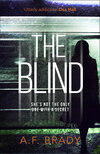Kitabı oku: «The Blind», sayfa 4
NOVEMBER 8TH, 11:03 A.M.
It’s Tuesday at 11:00 a.m., and Richard is about to come sit in my office for an hour. To date he has said nearly nothing to me until I ask him to focus on paperwork, and then he squeezes out one-word answers or angry refusals to respond. I am still scared of him, but it’s getting better. I’m trying to show Rachel that I am capable of managing this, that I will be the singular psychologist able to get through to him and eventually give him the help he needs. I need to maintain her approval, keep her A-plus rating. It keeps me functioning.
Despite wanting to save the day, my mind is elsewhere this morning; I’m harping on what could have been on Sunday night, so I am thinking of bailing on the attempt to work on the files with Richard. I haven’t yet made more progress than any of my predecessors, but I can’t handle another issue right now.
I hardly notice as Richard walks through my door and sits down with his stack of papers. He takes his hat off in my office and gently sets it atop his pile of newspapers. Sometimes he wears the tweed newsboy cap; sometimes it’s a gray one. He seems to have gotten more comfortable around me, now that we’ve had a few sessions and groups together. He sometimes says good-morning, sometimes nothing, but today I wouldn’t have heard him if he had greeted me.
After a short while, he speaks. “You’re different today.”
“Nope, I’m the same today. Same old Sam, right as rain.” I’m not even looking up.
“How come you’re reading that same page over and over, then? You haven’t turned that page in twenty minutes.”
“I’m concentrating.”
“On what?” He is incredulous; he is noticing. He is supposed to be crazy and I am supposed to be able to get away with my mind wandering sometimes.
“If you’re not going to work on your file or talk about treatment goals, then please, read your papers and let me do my work in peace.” Calmly, softly, defeated.
“I’ve never seen you in peace.”
What are you, my therapist? You’ll never see me in peace, Richard; stop looking.
We resume ignoring each other, and I sit quietly wondering what I’m doing with my life. Richard is shifting and wiggling uncomfortably in his chair. He reaches his crooked left arm out in front of him, as if trying to straighten it out properly. He huffs, and he’s distracting me.
“Something bothering you, Richard?”
“Yeah, what’s going on with that kid from the group you were running the other day?”
“I’m not sure what’s going on with Devon. Why do you ask?”
“He always does this contortionist act when he’s in group. I find it very distracting. And he always wears a jacket even though it’s practically boiling in here. He leaves confetti wherever he goes. He’s making me uncomfortable. How am I supposed to get better in an environment like this?” It seems it’s his size that’s making him uncomfortable, but I’d rather hear him complain than continue to avoid speaking altogether.
“Okay, what exactly is it that you would like me to do here?”
“I don’t know—you’re the shrink, not me.” Richard waves his hands at me dismissively.
“This seems like more of an administrative problem. Or even a janitorial issue. I can ask that he refrain from contorting in groups. But, you have to remember, this is an institution, and we need to live with the foibles and behaviors of others.”
“Within reason.”
“Yes, Richard, within reason, but a little shadow boxing never hurt anyone. Maybe what we need to talk about is your ability to tolerate frustration.”
“I tolerate it fine. I’m just not interested in being in groups with a man in a leather jacket who leaves confetti and makes himself into a pretzel.”
“Noted. I will follow up, and should I discover anything, I will let you know. Fair?”
He raises his eyebrows at me, unconvinced, and returns his gaze to his newspaper.
“And he stinks, too. Just sayin’.” One last jab and now he’s finished.
NOVEMBER 9TH, 10:00 A.M.
Jenni is nervously twisting the hem of her shirt in my patient chair. She has a long history of being abused, and associates anyone in a position of authority with fear and danger. She hasn’t been at Typhlos for very long, and she is still healing physically from the abuse she experienced before she got here.
“How are you getting along with your roommate?” I usually try to start sessions with something light and administrative so patients can get comfortable before we address anything serious.
“Tashawndra? She’s good. We make good roommates, I think. She’s clean and she keeps her stuff on her side, and I try to keep my stuff on my side, too. She’s been here for so long now, she knows all about everything, so she’s helping me get used to stuff. She lets me use her lotion.”
“I’m glad to hear that. Tashawndra is very nice. I’m glad you are comfortable in your living space. How have you been feeling since detox?” Jenni had to go to detox before being admitted to Typhlos because she was addicted to heroin and going through withdrawal.
“Better, but it still hurts. I’d never been so sick before. The smack just takes the life out of you, and when you can’t get any, it takes the life out even more. I thought I would never get better. It’s scary, when you get heroin sick. It’s very scary.” She holds her stomach and rocks back and forth as she says this.
“It is, and you’re very brave for committing to treatment so you’ll never have to have those withdrawal symptoms again. Now that your physical addiction is under control, we are going to be spending more time focusing on the psychological and the emotional components of the addiction. I’ve changed around your group schedule a little bit to include some recovery groups, and some dual-diagnosis groups, as well. You and I are going to spend time in our sessions talking about your addiction, too. You think you’re ready for that?”
“What’s duo diagnosis?” she asks, scraping at the edges of a scab on her head.
“Dual diagnosis. That’s when you have both an addiction to drugs or alcohol and a diagnosed disorder or mental illness. When you’re struggling with both those things at the same time, you’ve got a unique set of circumstances, and we want to make sure that you can get all the support you need.”
“Okay, that sounds good. What are we going to talk about in our sessions with you and me?” Jenni rolls up the sleeves she’d been tugging on and I can see the track marks still dotting her arms, from the crook of her elbow all the way down to between her fingers.
“Well, I wanted to start today by asking you to tell me a little bit about your history of drug use. When did you start, how did you use, those kinds of things. You ready for that?”
“Yeah, I’m ready.” She takes a deep breath and pulls what’s left of her hair into a stringy knot on top of her head. “I started doing drugs when I was really young. I was still in school, and I dropped out in tenth grade, so I must have been twelve or eleven or something like that.
“My mom was always out of the house; she worked two jobs and when she was finished working, she would go to the bars, so my sister and I were alone at home a lot. My sister, Jackie, is four years older than me. She had her friends and boyfriends over to the house all the time, and they would sit in her room and smoke weed and cigarettes and drink alcohol and listen to music. Her room was the garage.
“Sometimes I would come to the garage when she was with her friends, and I would just sit there and watch them, but I wouldn’t smoke or anything. She didn’t mind. Some of her friends were nice to me. There was one boy who came over who liked me, I think. His name was Ronnie.
“One time, he came over and sat next to me while they were all hanging out. I was in the corner next to the garbage cans, and he came over and asked how old I was, and if I had ever smoked weed before. I said yes, even though I hadn’t because I didn’t want to look like some lame kid.”
I silently smile at this notion, remembering being a kid among the older crowd, claiming to have personally experienced adventures I had seen on after-school specials.
“So, he handed me the joint and he told me to prove it. I took a hit that was way too big because I thought it was like smoking cigarettes, and I had smoked a cigarette before. I started coughing really hard, and I knew I was going to get sick, so I ran out into the driveway and I barfed all over the place. Ronnie came out after me and was rubbing my back. He told me I did good, and I could come and sit with them.” She looks at me and smiles a sad, nostalgic smile. “I don’t know why but I remember that night really well. After that, it all sort of gets hazy and blends together. I started sitting with them whenever they came over, and I started smoking weed every day. I was scared at first because I know you’re not supposed to do drugs, but they all told me that weed was a plant from the earth and that made it natural and only the chemical drugs were bad for me. They made it all sound like everything we were doing was okay. It was normal. Ronnie was always sitting next to me and rubbing my legs and my back.
“Sometimes he made me uncomfortable because he was so much older than me, but I liked the attention, too. I knew Jackie would never let anything bad happen to me. Then he started bringing in junk. They said that heroin came from a plant, too, the plant where the poppy seeds for the bagels came from, and they told me that if I was okay having a bagel with poppy seeds, then it’s the same thing.” She snorts and shakes her head. “I can’t believe I thought that bagels and junk were going to be the same.”
Jenni continues her story, telling me about Ronnie tying her arm off with a rubber band because the belts they were using on their own arms were too big for her skinny adolescent body. As with so many other patients here, she tells me of becoming dependent on both heroin and Ronnie, and the tables turning after a while—Ronnie starting to demand something in return. Jenni has been desensitized to all this and retells the story as if she were reciting a grocery list. The word rape has lost its meaning, and she reports that sometimes her sister, Jackie, would step in and offer herself in place of Ronnie raping her twelve-year-old sister.
“Jenni, we are getting to the end of our time today, so I wanted to stop and thank you for being so brave and honest about all of this. I think I’m going to add you to a women’s group that we offer here, where survivors of sexual abuse can work together to manage what happened to them.” Jenni cheerfully nods along as I talk.
As she walks out the door, I look at the scabs on her scalp, I see the missing chunks of hair. I see the track marks on her arms and thank God alcohol leaves less of a trace. I think of Ronnie taking advantage of her, pushing her into a corner with heroin and then not letting her leave. I think of Lucas. I wonder if I can walk away with all of my hair.
NOVEMBER 9TH, 4:46 P.M.
Richard is still complaining about Devon and his jacket; he’s become obsessed, and he isn’t letting it go. He spent half the day today indicating that something must be done about this man and his jacket and his confetti. We didn’t have a session together, but he showed up at my door over and over again, demanding action. I’m going to Shirley’s office. Shirley is Devon’s counselor, so she must know something.
“Shirley, what’s the deal with Devon? The jacket? I have a patient who is completely disturbed by his jacket. Don’t ask me why.”
“What jacket?” Shirley is eating a fruit cup with a plastic spoon.
“Really? Shirley? The leather jacket he wears all day every day. The old, scrappy motorcycle jacket? You can’t tell me you haven’t noticed this. He wears it every day. And what’s up with the confetti he puts everywhere? Every time I have him in a group, he leaves these little brown scraps of paper or paint or something behind. Do you not notice this?” I’m looking at her chair, and it’s covered in the confetti. It’s covered in everything.
“Oh, the shit jacket.”
“What? The what?” I’ve never heard Shirley curse. It’s like Grandma taking a whiskey shot or smoking a blunt—what the hell is this? “Shirley!”
“He wears that jacket as a repellent.”
“A repellent from what? From who?”
“Whom. It’s a people repellent. It’s his shit jacket. He learned this while he was homeless. He was constantly getting harassed while sleeping on the streets. He needed to find a way of surviving out there, so he smeared shit all over the back of his jacket so he would stink and people would stay away from him.” She says this like she is telling me the turkey is done. She is nonchalant and unfazed by this information. I’m fascinated and repulsed.
“Oh, my God, Shirley! They’re shit flakes? You mean to tell me the confetti all over the unit is really a pile of dried shit flakes! Jesus Christ!”
I’m slamming her door; I’m barreling into the bathroom. I’m scrubbing my hands, I’m fuming. I’m shocked. How is it possible that we have all been handling shit flakes, and Shirley never bothered to tell us any of this? Jesus, no wonder Richard was disturbed by the jacket.
I sit down at my desk and compose three emails. One to Rachel to ask her to confiscate the shit jacket now that I know it’s a fucking biohazard. One to the head of the maintenance staff asking for a deep clean of the group rooms. And finally, one to the staff to let everyone know that the confetti they have been surrounded with is actually dried shit flakes, and in case we had forgotten, we are surrounded by insanity. With the pressure to keep myself sane—the need to ensure that something exists to keep a line between me and my patients—days like these help me believe that there really is a reason that I have keys and they don’t.
NOVEMBER 11TH, 8:36 A.M.
“Good morning, Rachel,” I say with a sunshiny voice as I saunter through Rachel’s door and sit in her patient chair.
“Morning, Sam. You’re very chipper today.” She clears away a corner of her desk for me to put my files down so we can begin our supervision session. Rachel does very minimal supervision of the staff because she doesn’t have the time, and she is forced to believe that everyone is able to take care of themselves. There’s been a recent influx of new patients, and Rachel is preoccupied with placement and intakes, so she’s been putting off traditional supervision and replacing it with encouragement to call her if we have questions or problems.
“Chipper every morning,” I lie, swallowing my hangover heartburn. I put on my reading glasses and pull out Richard’s incomplete file. “So, I figured since we only have a short time together this morning, I should jump right into business.” Rachel nods, sips her coffee and swivels her chair to face me. She crosses her giant calves and waves me along. “Richard McHugh and I have been meeting weekly on Tuesdays at 11:00 a.m. There was a lot of speculation that he was uncooperative, but he always shows up to our sessions, and he’s always punctual. He seems to like the structure. Now, that being said, he is extremely uncooperative during the sessions. He is absolutely unwilling to complete the psychological assessments and gets very defensive and cagey when I try to pull any information out of him.”
“Do you feel safe in sessions with him?” Rachel asks.
“Sure. He isn’t threatening or violent, he’s just very quiet and guarded. I don’t imagine that he would hurt me. He seems to be protecting himself by staying quiet. He doesn’t like to share his story.”
“Have you been able to determine why he was in prison?”
“No. This is actually one of the other issues with his chart; there isn’t a lot of stuff in his continuation-of-care section. I have the names of the halfway houses he attended, but no contact number or contact person there, no sponsor or mentor. I have the names of the prisons he was in, and the dates he was there, but no further information. It’s all very unclear. There are some xeroxed pages with huge swaths of the page blacked out. There is no information about the charges, so there’s no way to know what he did to end up in prison. And he certainly hasn’t made any effort to tell me.”
Rachel nods. “I was the one who did his intake, actually, and I found the same thing. There was very little information available to us, but he was strangely insistent on coming here. He didn’t tell me much of anything at all, but he was polite, if standoffish. It’s a complete question mark. I got in touch with the teams at Revelations and Horizon House, the halfway houses, but they didn’t have anything on him. The staff turnover at those places is ridiculous, and they don’t seem to keep proper records.” She’s reaching around her desk and pulling at scraps of paper poking out of various in-boxes and out-boxes. She’s looking for something.
“Have you had patients like this before? I’m not entirely sure how best to proceed. He’s a giant question mark, like you said, so I don’t know how to properly place him in groups, and I’m not sure how to draw out the information we need to help him.” Rachel loves it when I ask her for advice.
“I’m looking for his original intake stuff. I gave him a blank sheet to write on when he refused to fill out the intake materials. I asked him about his goals for treatment and that kind of thing. I know he scribbled something down, but I can’t remember what it said.” She pushes her chair around the office, opening file drawers and checking inside a massive disorganized cabinet.
“For now, I’m just going to keep up our weekly sessions,” I reassure her, “keep him in some of the high-functioning, intellectual groups, and see if we can get him comfortable with me, and maybe then he’ll come out of his shell.” Rachel doesn’t seem to be listening to me anymore as she’s seeking this document.
“Here! Here it is,” she says, pulling a page with rolled corners from the back of a notebook. “See if this can be useful to you.”
I take the page from her hands and look over Richard’s handwriting. He was using a dull pencil and the lines of his cursive are blurry and uneven. He made a heading that says “Goals at Typhlos” and he filled in the section with bullet points: “To get better. To forgive. To reenter life.” He specifically writes Typhlos in various places on the sheet. He obviously wanted to come here in particular. There are several other sections, but the pencil lines have been smeared and I can’t read much. Under another heading called “Therapy,” he wrote something that looks like open up and something else that looks like Samantha.
NOVEMBER 14TH, 12:34 P.M.
It’s snowing outside. I’m up on the corner of my desk, staring out the window. The guys on the scaffold are still working, despite the change in weather. It’s been brutally cold, but for some reason, when the snow starts, it feels warmer. Like the snow is creating a blanket that covers the world and keeps it safe. The flakes are fat and wet and sticking to the cars parked on the street below. In the city, the snow only stays beautiful for a couple of hours. Once the plows come through, the perfect white shroud becomes a thick, gray sludge, sometimes piled to waist height. The only thing I miss about my house growing up is the way the snow stayed untouched.
My door is slightly ajar, and I hear the chatter of patients in the hallway. My office is across from the computer room, a popular spot for patients to try to break into porn sites or gather to chat with each other. There are two dilapidated couches and someone is always asleep in there.
I hear an unfamiliar voice outside my door, probably someone leaning against the wall outside the computer room. It’s a man’s voice, Brooklyn accent, and the hiss of missing teeth. His voice is loud and abrasive, but he hushes it down to a whisper scream to add a conspiratorial air to his story. I move to the crack in the door and listen to him without showing myself.
“It’s women—women get you into these places, man. No matter what you do, you can’t please ’em.”
“A woman got you in this place?” Another male voice I can’t quite recognize.
“Yeah, she did. My ex.”
“What did she do?” Whoever is telling this story is certainly commanding the attention of his listener.
“Well, she broke up with me, first of all. Then she went and started fuckin’ my best friend. Mmm-hmm. And you know that ain’t right. So, I had no choice; I had to get her back. Ain’t nobody gonna disrespect me like that.”
“How’d you do it? How’d you get her back?”
He hushes his voice back down to the whisper scream: “I killed the bitch.”
“You killed her?” The listener gasps.
“Man, shhhhhh! Shut the fuck up, yo. I ain’t gonna tell you nothing you keep hollerin’ like that.”
“How’d you do it?” the listener whispers back. I’m still eavesdropping from my office. I’m not concerned yet—these kinds of grandiose stories are not uncommon here. Some patients treat the unit as if it were prison, and the scarier they make themselves appear, the safer they feel, so bullshit stories about murders are rampant.
“Ha. I’ll tell you how I did it. She had a house in the Bronx, right? And she would let her dog out the back to run around and piss and whatever. So one night, I went to her house, and I waited for her to let that dog out. Once I seen the dog, I jumped the fence and I grabbed him.”
I hear chairs from the computer room scooting across the floor, followed by a few short footsteps. The story is getting more listeners.
“He was some old shaggy piece of shit dog. I had a can of lighter fluid with me, and I dumped it all over that dog. He was so stupid, he started to lick it off. He liked it, too. Just kept lickin’ at that lighter fluid. But he stopped when I lit him up.”
“No shit? You lit the fuckin’ dog on fire?”
“Damn right, I did! And he starts barkin’ and yellin’ and shit, so I pick him up, and I throw his ass through the back window of the bitch’s house. It smashes the window, and the curtains got lit up, too. I could hear the dog, and it was screamin’ and then I heard Alisha, and she start screamin’, too. And she trying to put the dog out, and he dyin’ and the fire just getting bigger and bigger.” His voice is getting loud now, and I can feel my fists clenching.
“So, she says ‘fuck the dog, I gotta get out,’ and she runs out the back door, and where am I? Right there waitin’ for her. And it’s dark out, and she don’t even see me, so she runs right into me. I grab her and turn her around so she has to watch the house burn. I put my hand over her mouth so she can’t scream. You see that?” I can almost hear the craning necks looking to see what the storyteller is showing them. “Bitch started biting my hand. But she stopped biting when I popped her in the mouth.
“The house was going up fast, I mean fast, and it started to get hot and the smoke made it hard to see, so I pulled her back into the alleyway behind the house. She was kickin’ and pullin’ and she knew she couldn’t save nothin’, and so she stopped strugglin’ and just watched it burn. The fire was mad loud, and then when the trucks came, you couldn’t hear nothin’, not even screamin’. So I took my hand off her mouth, and I told her: this is what she gets for fuckin’ with me.”
“And no one saw you? You didn’t get caught?”
“Nah, man. Nobody even knew we was there. And she starts beggin’ and sobbin’ and slobberin’ all over, and that’s when I finished it. I just put my hand around her neck, and I squeezed. Didn’t even take that long.”
I feel my face contort into an angry grimace as I hear this macho bullshit. I find myself overwhelmed with disappointment at the pathetically appreciative response from the listeners. This sociopathic story, this admiration from peers—I’ll never understand this shit. The more I keep hearing it over the years, the more I feel like it’s seeping into me, disturbing my sanity. I keep listening and I hear some of the guys relaying bits of the story to latecomers. I even hear what sound like high fives. And then I hear raspy, almost panicked breaths. I hear a familiar voice now, shaking, furious. Tyler.
“You set a woman’s dog on fire? You threw her dog into her house and her house caught fire?” Tyler has obviously been listening, and he is appalled.
“Yeah, bro, and what?”
“And what? You murdered her? For cheating on you?” His voice is getting higher.
“You got problems, bro?”
“Yeah. Yeah, I got fuckin’ problems.”
“Hi, guys!” I shout as I open my door and pretend I haven’t been listening. “What’s happening? How’s everyone?” It’s clear there’s tension in the hallway, and various patients have fled to the safety of the couches in the computer room. Everyone’s eyes are glued to Tyler and the storyteller.
“Hi, I’m Dr. James. I don’t think we’ve met.” I extend my hand to the storyteller, who has his eyes trained on Tyler. He ignores me. “What’s your name?”
“Floyd.” He still won’t take his eyes off Tyler. Floyd is about a foot shorter than Tyler is, but has probably sixty pounds on him. Tyler is vibrating with anger.
“Miss Sam, I don’t think you should be here right now.”
“Really, Tyler?” Chipper, unaware. “How come?”
“This man got no respect for women.” Tyler is shifting his weight from one foot to the other, clenching and unclenching his fists. Floyd doesn’t move. He stares, unblinking, at Tyler, waiting for him to act.
“Pitchers and catchers report in a couple months, you know.” Talking Yankee baseball with Tyler is my ace in the hole to defuse this without security or backup. “Floyd, are you a baseball fan?” I ask as I move to the space between them, and the air is thick with perspiration and rage. “Tyler and I are huge Yankee fans.” I’m a little taller than Floyd, so when I’m up close to his face, he has to shift his gaze to make eye contact with me. I’m obscuring his view of Tyler, so he’s forced to address me.
“Yeah. I could watch some baseball, miss.”
“America’s pastime. It’s a beautiful thing. Now—” I clap my hands together “—where are you gentlemen supposed to be? I’m sure there’s something productive we could all be doing instead of loitering here in the hallway, huh?”
No one responds to me, but several patients observing from the computer room peel themselves off the couches and move on. Tyler is backing up slightly, but I can still feel his breath at the back of my neck.
“No? Okay. But I’ve got things to do. Tyler? Want to walk me to my next group?” I know Tyler is a gentleman and he wouldn’t let a lady walk by herself if she asked for an escort.
“Alright, Miss Sam.” I hear his teeth grind as he steps in front of me and starts slowly moving down the hallway. I pull my glasses down my nose and glower at Floyd.
Tyler and I walk down the hall, and I again ask him about baseball. Completely distracted, trying to shake the story from a moment ago, he falters and mumbles. When we reach an empty group room, I step inside and ask him to follow me.
“Tyler, when you hear something like that and you react, it just feeds the beast. He was telling that story to get a reaction out of people. Let’s not give him the satisfaction, okay? When you’re disturbed by somebody, you walk away. You don’t engage. Come find me or another staff member if you feel you’re not able to take it, okay?”
“He killed that dog. I just got so mad when he said he killed that innocent dog and that innocent lady.”
“Yeah, me too, Tyler. Me too. But we can’t let it get to us, okay? We have to rise above it.”
“You think it’s bullshit? He’s making it up to scare the other patients?”
“Maybe. Maybe he’s making it up. But even if he didn’t kill an innocent dog or an innocent lady, you and I both know that there are innocent ladies and dogs getting killed every day. But we can’t go to pieces and get in fights because of it. You’re here to take care of you, not to worry about anybody else. Right?”
“Yeah. I know you’re right, Miss Sam. I’m here to worry about me. And the Yankees, because, last season, our pitching wasn’t looking so good.”
“You’re damn right about that.”








